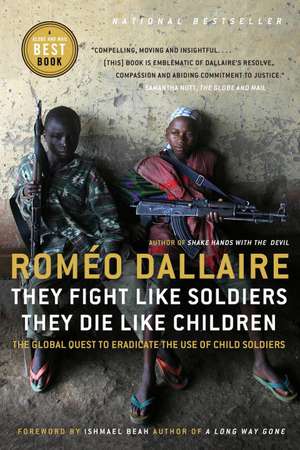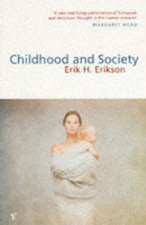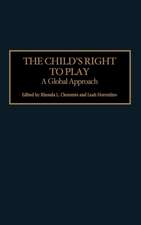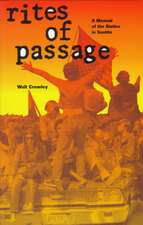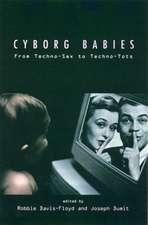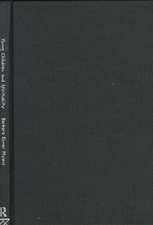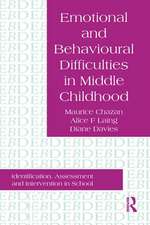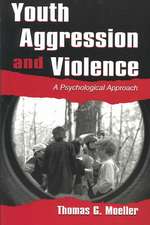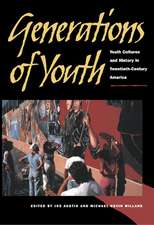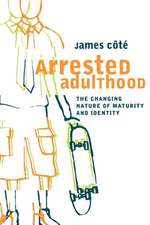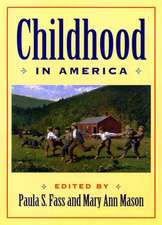They Fight Like Soldiers, They Die Like Children
Autor Romeo Dallaireen Limba Engleză Paperback – 13 sep 2011
In conflicts around the world, there is an increasingly popular weapon system that requires negligible technology, is simple to sustain, has unlimited versatility and incredible capacity for both loyalty and barbarism. In fact, there is no more complete end-to-end weapon system in the inventory of war-machines. What are these cheap, renewable, plentiful, sophisticated and expendable weapons? Children.
Roméo Dallaire was first confronted with child soldiers in unnamed villages on the tops of the thousand hills of Rwanda during the genocide of 1994. The dilemma of the adult soldier who faced them is beautifully expressed in his book's title: when children are shooting at you, they are soldiers, but as soon as they are wounded or killed they are children once again.
Believing that not one of us should tolerate a child being used in this fashion, Dallaire has made it his mission to end the use of child soldiers. In this book, he provides an intellectually daring and enlightening introduction to the child soldier phenomenon, as well as inspiring and concrete solutions to eradicate it.
From the Hardcover edition.
Preț: 101.93 lei
Nou
Puncte Express: 153
Preț estimativ în valută:
19.51€ • 20.21$ • 16.28£
19.51€ • 20.21$ • 16.28£
Carte indisponibilă temporar
Doresc să fiu notificat când acest titlu va fi disponibil:
Se trimite...
Preluare comenzi: 021 569.72.76
Specificații
ISBN-13: 9780307355782
ISBN-10: 0307355780
Pagini: 320
Dimensiuni: 151 x 224 x 22 mm
Greutate: 0.36 kg
Editura: Random House of Canada
ISBN-10: 0307355780
Pagini: 320
Dimensiuni: 151 x 224 x 22 mm
Greutate: 0.36 kg
Editura: Random House of Canada
Notă biografică
LGEN THE HON. ROMÉO DALLAIRE (Ret) served thirty-five years with the Canadian Armed Forces and now sits in the Canadian Senate. His Governor General's Literary Award-winning book, Shake Hands with the Devil, exposed the failures of the international community to stop the worst genocide in the twentieth century. It has been turned into an Emmy Award-winning documentary as well as a feature film; it has also been entered into evidence in war crimes tribunals trying the perpetrators of the Rwandan genocide. Dallaire has received numerous honours and awards, including Officer of the Order of Canada in 2002, Grand Officer of the National Order of Québec in 2005, the Aegis Award for Genocide Prevention from the Aegis Trust (United Kingdom) and the United Nations Association in Canada's Pearson Peace Medal in 2005. As a champion of human rights, his activities include work on genocide prevention, the non-proliferation of nuclear weapons and the Child Soldier Initiative, which seeks to develop a conceptual base for the elimination of the use of child soldiers.
From the Hardcover edition.
From the Hardcover edition.
Extras
1.
WARRIOR BOY
When I was a child, my father set out to build a cabin in the bush in the Laurentian Mountains in Quebec. The site was on a small cliff overlooking a violin-shaped lake, with virgin bush for tens of kilometres in nearly all directions around it. In the late fall and winter, the local farmers would go into the woods with their enormous horses and chains and tackles and sleighs to cut and then haul out spruce and cedar, and even the odd oak, to the provincial road where the logs would be piled sky-high until spring. I would marvel at these weather-beaten and muscle-bound farmers and their sons, who seemed to effortlessly wield enormous axes and bucksaws a hundred feet long.
My father was a staff-sergeant serving in the Canadian Army, with three children and a wife to support and no money to spare on any kind of a dream cabin. And so he brought down some of the huge trees around the site (he’d been a lumberjack before he joined the army in 1928), had them sawn into lumber at the village sawmill, and over the course of several years scrounged the rest of what he needed to complete what we not-so-affectionately dubbed the Slave Camp. Nothing really fit, be it window, plumbing or stairs. The dock regularly went astray, as the battle between man and beast (the beavers) kept the water levels in constant flux. A trip to the cabin meant steady work.
Beyond the need to constantly tweak the make-do materials of our shelter in the woods, there were other reasons for the unending labour. Dad was a huge man with a very powerful chest, heavily tattooed arms, and hands that could smother a pineapple. He was a veteran of the Second World War, and like many veterans was haunted by that experience, sometimes to the point of allowing that destructive world to invade our home life. When the brain injury we now call post-traumatic stress disorder (PTSD) took hold of him, he was reliving, not remembering, the carnage he had witnessed, and perhaps caused. Sometimes he could damp down the horrors with alcohol, but often that didn’t work. The cottage turned into a therapeutic instrument that provided him with a healthier outlet for his demons. He essentially lived for the summer weekends and the two weeks of vacation each year when he could escape to the bush and work on “his” cabin.
Dad really needed to keep busy, and he expected his only son to act as his gofer. How I despised that job. Go get this, and that, and the other, for hours on end when the lake was beckoning me to swim, to fish. But no, that was play and there was no time for that when he was at the lake.
I lived for the summer days when Dad had to be in town, leaving my mother, my two sisters and me at the cabin. Although he’d pile enough chores on me to keep two men busy all week, I now had the lake to swim in without having to guiltily avoid him, and the nearby sandpits to disappear into, where I built grand fortresses and fought the greatest battles of all time on its plains using small plastic soldiers and Dinky Toy tanks. And I had the endless bush to discover.
The forest was dense and totally enveloping. I would roam at will, stopping often to idle, to listen for birdsong and animal rustling, and to dream in unadulterated freedom. I forded creeks and swamps, and climbed high cliffs to bask on large exposed rocks where the sun would soon cover me with sweat. Alone in my humanity, I shed all constraints, rules, hypocrisy, pain and sorrow, escaping from that intense childhood stress of living according to other people’s demands.
At a swamp’s edge between small lakes, birds fluttered, ducks and wild geese swam, and bugs skated on the surface of the water. There was abundance for all and no sign of calamity or friction. Life buzzed along in a sort of symphony of small sounds that soothed rather than worried or excited me.
I would daydream in the stillness, experiencing pure joy. I would tear my T-shirt into two pieces, mark it up with crayon and dirt, then string the pieces, front and back, like a loincloth. In that moment I had transformed into a Huron, an Iroquois, a Cree, a Montagnais. I was a warrior. I was a brave, skilled in the ways of the forest and free to move by instinct, by need.
The forest protected me. The canopy far above shaded me from rain and wind, and the soft forest floor cushioned my steps. I learned how to run swiftly and stealthily, without the rustle of a branch or the snap of a twig.
Among the trees I had no boundaries except what I could see and smell and touch and sense. I was alive and I was without limits. I would observe the chipmunks and marvel at the speed and adroitness of their skirmishing, neither hurting their opponent nor injuring themselves in their leaps and bounds from the forest floor to the ends of hanging limbs. I would listen to birds and wonder at so many disparate songs and screeches, and their mastery of communication. The rare deer I spotted would remain motionless to blend into the brush, but its big eyes would always give it away, for they sparkled. With a wave of its tail, it would eventually relax and move on, nibbling at vegetation as it went.
And then there were the bugs and bugs and more bugs: scurrying around old fallen dead trees and in the trunks still standing, or scuttling away from me in the mud when I lifted a mat of fallen leaves, or gliding on the surfaces and diving in the depths of the little streams. The rat-a-tat-tat of the occasional woodpecker punching holes in rotting trees and feasting on their tiny but abundant prey led me to imagine how it must have been for soldiers at the front facing murderous machine-gun fire. It seemed an unfair match.
The ants were busy and impatient, as were bumblebees, whereas friendly ladybugs would stop for a rest on my arm and look up as if to say something important before flying away. Butterflies were like that, too. They seemed to take the time to show off their magnificent wings, as if they were gracing me with a visit rather than working to survive.
One majestic insect stood out from all the others. The dragonfly did not seem particularly interested in me; it remained aloof even when lighting briefly on my arm, as if it didn’t matter that I was watching. By name alone, the dragonfly evoked images of a place that existed within and beyond my childish imagination: a magic world of castles and wizards, knights and fair damsels, dark forests and the evil that lurked therein. The other insects had their own exciting roles to fill. I was fascinated with their passion for survival. My forest friends, without exception, were obsessed with building, carrying, protecting. Their lives were perfect examples of Thomas Hobbes’s view of existence in the state of nature—“nasty, brutish and short”—and yet I saw a magic in their existence that I did not see in my own.
To me, the dragonfly was the leader of the insect world, superior in strength, beauty and skills but, I imagined, compassionate also. The dragonfly led me into a world I created for myself, far away from civilization with its pain and hardships. I built that world not from fantasies, but from the realities of my life. I would play out an experience that had frustrated me with my cast of insect characters, reworking it to my satisfaction. In my forest world, I could correct injustices and stand up for myself and other small, weak and young creatures. In this world of freedom and play, I was unconsciously creating my character as a human, and becoming a man.
At the end of a day of such play, when I stumbled back to civilization, with all its harsh realities and limitations, I carried my imaginary world in the recesses of my mind. It was there whenever I needed to escape. It was my refuge, my place to enjoy and learn, my place to settle my emotions and work out my inner battles to understand the confusing and difficult adult world around me.
No matter how I clung to it, however, I could never use it to resolve the anxious pain in my stomach I felt when I had to emerge from the freedom of the forest and return to the confines of the adult world with its clothes, chores and rules. At times, of course, the real world contained people who offered me genuine love and respect, but they were few and far between. I felt as if the adult world was a place where there was no time to play, too much work, and zillions of restrictions on how and why to do things designed to mould me to its will. This indoctrination was conducted without consent on the part of the child. Au contraire, it was done “for your own good.”
How I would come to dread the appearance of the long shadows made by the enormous maples of the forest, announcing that the day was coming to an end. As the sun made a fast getaway behind the hills, I would be plunged into semi-darkness. It often caught me by surprise, this darkness that brought me back to the adult world each night.
And, as the summer drew to a close, the shadows signalled a complete return to the adult world over the long winter months, without the respite of the forest.
With the hangover from the Labour Day weekend’s grand fete resolved with a last swim, we joined the great procession of city dwellers heading back home—into lives of opulence for some and into urban swamps for others. We lived in one of the swamps: east-end Montreal. I dreaded the stench of the petrochemical plants around which the government had built cheap and “temporary” wartime housing for veterans and their families.
You could smell my part of town from the other side of the city if the wind was blowing in the right direction. You could see my part of town from space due to the large flames from the oil refineries and petrochemical plants. You could hear my part of town for miles, as the massive mosaic of intertwining refinery pipes spewed gas and steam from their pressure valves. The air was too toxic for us to play outside for long. We never cut the grass, as it could not grow. There were no leaves to rake in the fall because they all fell, withered, by the third week of June.
But as my dad would say, over and over, the roof doesn’t leak, the furnace has fuel, the inside of the house and our clothes are clean, and there is enough food for three meals a day: what more do you want? You can survive the bad air for a few months.
And so, in the absence of a Laurentian forest in my backyard, I attempted to create a world of make-believe indoors. Grand battles with brave commanders played out on the large, reddish, living-room rug. By day, I was a student, a Cub Scout, an altar boy, a folk dancer, a flag carrier in the band and, later, an army cadet. But at night, with playing cards, plastic soldiers and metal Dinky trucks and tanks, I guarded fortresses and conducted great flanking manoeuvres in the semi-darkness of the living room. It was not unusual for my parents to find me asleep on the battlefield after three or four hours of intense activity in my own world, where soldiering was never eternally fatal: we always rose again to fight another day.
As the years passed, our family atmosphere became more tense, and increasingly I became isolated from my sisters, my harassed mother, and my strict and troubled father. School life was burdened by the ever-present Brothers of St. Gabriel, and the increasing French-Catholic/English-Protestant tension in the parish.
The ethnic and cultural mix in our part of town was dominated by French-Canadians, with a smattering of Anglos here and there. When I hit school age, I was sent to a French-Catholic school while our English neighbour’s daughter, the same age as me, was off to her English-Protestant school. From then on our daily schedules were different, our days off from school were not often the same, and I spent more time at school and in church than with the Anglo friends I had played with on the block. No adult explained why we were forced into these two camps or attempted to moderate the effects.
Disquieting ideas started to creep into our conversations at school, influenced by some of the older kids, who probably heard things from their parents. Negative intent, ill will, ignorance of the other, isolationism, disdain and, at times, envy. Nastiness soon festered in the alleyways, on the way to school and in the schoolyard, but only later in any overt way in the classroom. Gradually Anglo-Protestants became the historical and constant adversary, and despite my confusion I knew I had to adopt this new perspective on my neighbours, or else.
The small fields that survived around the wartime housing development, the alleyways behind each block, the skating rinks in the small asphalt playgrounds a few streets over, the sheds behind family homes: all these zones became confrontational terrain upon which hatred, anger, fear and even at times blood was spilt in the name of something we absolutely could not understand: they were the Anglos (les têtes carrées) and we were the French (frogs) and we had to be antagonists without question.
Blindly we learned to dislike, mistrust, hate, despise and ultimately denigrate old friends, to treat them as not as human as we were. Though I was often caught in the middle because I had gone to Cub Scouts where we spoke English, I never lost the desire to be on both sides and neither side of the cultural and linguistic divide.
We were kids being influenced by a world run by adults and orchestrated by their beliefs, disappointments, ambitions and fears. Our kid world was simply buried by the attitudes of the bigoted, by perceived and real inequalities, by historical and long-festering adult frustrations. That adult truth made our preschool world just “kid stuff.” And we forgot that once upon a time, we simply played with other kids, whoever they were, from wherever they came.
By the age of about twelve, I was wondering how I could escape from the looming, oppressive realities of home, of school, of street corner. There was the lake, which I could escape to, but which had the drawback of the constant toil for my father. When I went to high school, I was obliged to join the army cadet corps and take part in weekly drill parades. As the end of the school year approached, I volunteered and was chosen for army cadet summer camp. I had lived my entire life under the thumb of a firm disciplinarian who was a stickler for eating on time and being home by curfew. I was used to uniforms and shining boots. It was like I would be going from one institution to another, except for a major difference. Within the confines of the huge army camp, and among a couple of thousand other boys, I would be my own person. It seemed like a chance for a bit of adventure, a chance to fulfill my fantasies of being a gallant, noble and fearless warrior.
But I soon learned that many of the boys and young men at cadet camp were not there for summer fun, freedom and adventure. The older boys in positions of authority were playing for keeps and for the attention of the instructors. They were already aware of the criteria for advancement and privileges in the military, and had their eye on future opportunities in the escalating chain of command. They already fit into the regimented mindset of pride in the uniform, the team, the platoon. They could smell the prize of winning the commander’s weekly pennant and the prestige it would give them among the other junior leaders and lower camp dwellers.
They compelled the young campers to fit, as best we could, into uniforms tailored for the adult men of the last great war. They ensured we kept our quarters, our kit and our spit-polished boots as per the specifications laid out in the bivouac guide. They were always looking for ways to improve our platoon and company surroundings. As ravenous as beavers, they would send us out into the woods after supper to cut birch and poplar branches to bring back to our tented lines so that we could build fences with various geometric designs and an elaborate, yet fragile, archway to the orderly room, the centre of the company. The fences and the arch required near-constant repair, but the effort was designed to foster team spirit, to nurture pride and self-discipline.
And then there were the rocks. We were sent scurrying over the fields and into the woods looking for rocks to mark the boundaries of the walkways. We painted them all white. Where the paint came from remains a mystery to me, as the quartermaster’s stores were always out of everything and out of bounds. We ended up with white rocks all over the place in neat lines. We raked the sand and dirt of the paths inside these lines as if we were apprentice Japanese gardeners. And heaven help the cadet who walked beyond the rocks; his Saturday was immediately volunteered to freshen the yards for the Sunday church parade. Yes, we had church parades. Christian values were strong among the veterans who ran the camp, who had seen the worst that humanity could offer.
Like my peers, I was anxious to please and to avoid punishment. We were children in a very adult business, offering very small gestures to express our loyalty to our platoon, our company. Doing things better than the other groups of boys around us fostered esprit de corps: a sense of belonging that rested on excelling at activities and not on some specious air of superiority. Our cohesion had nothing to do with the evil expressions of ethnicity and culture that created so much hate back on my city streets, and everything to do with the positive sense of worth we were gaining in this very structured organization. Amazingly, the fact that we were learning warlike skills with weapons that were taller than us never really registered. None of our commanders pointed out that these weapons were made to kill other humans. They were purely for target practice on paper bull’s eyes at six hundred yards, conducted under the close supervision of qualified instructors.
The relatively few adults at the camp were either real soldiers and veterans of the wars overseas or officers of the reserve, many of whom were teachers during the school year. Some of them were members of the religious orders who ran the cadet corps in the Catholic schools and community centres across the province. Those Catholic brothers and fathers, some Jesuits, felt no hesitation at donning the khaki uniform and easily fit into the military life with its organized way of going about things. Were they the descendants of the monkish knights of medieval times who fought the infidels in the Middle East? Hardly, but they certainly were at ease with military discipline and order. And, in my observation, they liked to throw their weight around.
Maybe I would have become a good brother or priest. I liked the distinction of wearing a uniform that displayed who I was on its shoulders and breast. I was used to never having any money but still getting by. I was at ease in an organization that knew what it had to do and how to go about doing it. I could be me within an organization that created uniformity. I could wear the uniform but still be free inside this structured life that was clear, unambiguous and overt. The army was big and powerful and yet also welcoming and very human indeed.
In the vastness of the tented camp, among thousands of other boys, in the all-encompassing way of life, in a real expression of belonging, of supporting others and being counted on and supported by others, too, I found my soul. Unabashedly and generously offered such richness by the army—the institution, its ethos and its people—I responded with zeal. I found my vocation there: that world of the army cadet linked seamlessly—astonishingly—with the imaginary world of my childhood.
The vets gave the summer cadets the sense of being part of something much bigger, steeped in history and traditions, sacrifice and glory. They made and applied the thousand-and-one rules around the camps that ensured we remembered we were in the army now and not somewhere in upstate New York bunking down with a bunch of bored rich kids. Rain or shine, they never seemed to either sleep or waver in the maintenance of the “standard” of perfect order and good discipline, and heaven forbid if you dropped a candy-bar wrapper on the grounds. That wrapper went into the garbage pail, but not just any pail, as some were there just for show and were spotless inside and out.
Although all the veterans smoked like chimneys off duty, they had a particular aversion to finding cigarette butts dropped even on the grass. We wanted to learn to smoke in order to emulate these old sweats. We would roll our cigarettes individually with varying levels of success—I ended up smoking more paper than tobacco for the longest time. We would try to talk and do odd jobs with the cigarette in the corner of our mouths and the longest possible ash still attached. But either the smoke got into our eyes and nearly blinded us or the ash fell on our clean boots and made a mess. We were very careful where we dropped our cigarette butts.
Still, for the longest time, we were allowed to remain kids playing at a grown-up game. I was a boy soldier, an apprentice at some of the skills, but I had not yet acquired the ethic of the warrior class in our democratic and peaceful society. We were playing at soldiers. We never really believed we were preparing for war. We never really thought it could happen. The closest we ever got to a battlefield was the odd evening war story from a veteran, although as a rule they tended to be quite tight-lipped about their war experiences. But boy, did we love the stories they told, stories edited to stress the valour and not the horror.
We also loved Saturday movie night: black-and-white Hollywood epics featuring great First or Second World War battles were shown in the huge drill hall, with all of us sitting on the floor downing the only Coke and chocolate bar we were allowed to purchase each week. The echoing drill hall amplified the sound of the guns and screams on the soundtrack, and the brave words of the combatants. When the lights came up, we would be marched back to our tents, high on sugar and often still dazed by the scenes on the screen.
Dreams came easily once we’d quieted down and closed our eyes. On my favourite nights for sleeping, light summer rains beat on the canvas of our large, canopied tent. Some of the canvas walls bore graffiti from others who had slept on the top bunk, close to the roof, like I did. Were they soldiers of the war or were they last summer’s cadets? I never could read the faded scribbles, but this did not stop me from thinking about them each night as I entered my own secret, special, boy world.
Yes, my world. That totally imaginative place that was everywhere and nowhere would come to life when I closed my eyes against the reality around me, night or day. At times I would be reprimanded for daydreaming in the most unexpected places, such as when standing to attention during inspection parades, or on the rifle range firing point (waiting with my relay for the order to lay down and pick up five rounds of .303 calibre Second World War munitions), or walking in a column through the dark forest as we practised night orienteering.
In the poorly lit classroom tents where only an occasional breeze reduced the heat and humidity, I was an ace at escaping into my world. I amazed myself at being able to walk in file surrounded by comrades or to lay cold and shivering under my poncho in the wet grass at first light, and still cross into my world. With a flicker of thought, I would be back in the forests of the Laurentians and I would be free and wild and so very much alive.
By the time I was into my eighteenth year, I had been back to cadet camp several times and had achieved considerable success in leadership roles. During my last summer camp, the die was truly cast: I received my acceptance to military college. Attending the Collège militaire royal de Saint-Jean for five years and then the Royal Military College in Kingston, Ontario, were my first steps to becoming a career officer and a university-educated citizen.
—
I passed from childhood and became a man—a soldier, an officer, a general—but the boy never really disappeared. My imaginative world remained alive, if often dormant, inside that evolving, professionally trained military commander who manoeuvred in the adult world. Marriage and kids of my own did not reduce my longing to escape at times into my own universe. And I tried to foster a similar imaginative space in the psyches of my children, or at least to help them realize that their life’s ambition was not simply to become an adult, but to become themselves, masters of their internal realm of freedom and imagination first and foremost. I believe that children must have room to protect that place in their brains that makes them different and unique for their short lives on this planet and for the eternal lives of their souls.
The adult soldier goes about the business of mastering the craft of controlled violence, of living and staying alive in far-off lands for causes that are seldom clear or even tangible. Keeping peace, upholding freedom, defending human rights, protecting the moderates and the innocents caught in the crossfire of conflict, creating the buffer zones of fairness and security—these are definitions of a soldier’s role that have evolved over centuries in which hundreds of thousands of people have suffered, paying the price for change, for reform, for a better way of life. The gallant old soldiers who taught me as a boy created a learning atmosphere that was serious yet very considerate, very human, inculcating lofty ideals and noble-warrior dreams in their charges.
The contrast between my path as a youth and the path of so many youths and children in war zones and failing states today is stark. We cadets knew all this military stuff would be over in so many days that we could strike off on the calendar. The child soldiers under the gun of inhuman adults see no end in sight. My teachers took care of us and understood we were only boys, but the men and women leading their contingents of child soldiers destroy the children and youth they indoctrinate, literally and spiritually—sacrificing them at the whim of their ambitions and perverse needs.
The world of the child soldier was not portrayed in any of the doctrine and tactics books that had been my soldier bibles before I arrived in Africa in 2003. I was completely unprepared to come in contact with an enemy who wore the trappings of childhood so familiar to me, but who was so different from the soldier I had become. I was so unprepared that for a long time I was blind to the implications of what I was seeing.
From the Hardcover edition.
WARRIOR BOY
When I was a child, my father set out to build a cabin in the bush in the Laurentian Mountains in Quebec. The site was on a small cliff overlooking a violin-shaped lake, with virgin bush for tens of kilometres in nearly all directions around it. In the late fall and winter, the local farmers would go into the woods with their enormous horses and chains and tackles and sleighs to cut and then haul out spruce and cedar, and even the odd oak, to the provincial road where the logs would be piled sky-high until spring. I would marvel at these weather-beaten and muscle-bound farmers and their sons, who seemed to effortlessly wield enormous axes and bucksaws a hundred feet long.
My father was a staff-sergeant serving in the Canadian Army, with three children and a wife to support and no money to spare on any kind of a dream cabin. And so he brought down some of the huge trees around the site (he’d been a lumberjack before he joined the army in 1928), had them sawn into lumber at the village sawmill, and over the course of several years scrounged the rest of what he needed to complete what we not-so-affectionately dubbed the Slave Camp. Nothing really fit, be it window, plumbing or stairs. The dock regularly went astray, as the battle between man and beast (the beavers) kept the water levels in constant flux. A trip to the cabin meant steady work.
Beyond the need to constantly tweak the make-do materials of our shelter in the woods, there were other reasons for the unending labour. Dad was a huge man with a very powerful chest, heavily tattooed arms, and hands that could smother a pineapple. He was a veteran of the Second World War, and like many veterans was haunted by that experience, sometimes to the point of allowing that destructive world to invade our home life. When the brain injury we now call post-traumatic stress disorder (PTSD) took hold of him, he was reliving, not remembering, the carnage he had witnessed, and perhaps caused. Sometimes he could damp down the horrors with alcohol, but often that didn’t work. The cottage turned into a therapeutic instrument that provided him with a healthier outlet for his demons. He essentially lived for the summer weekends and the two weeks of vacation each year when he could escape to the bush and work on “his” cabin.
Dad really needed to keep busy, and he expected his only son to act as his gofer. How I despised that job. Go get this, and that, and the other, for hours on end when the lake was beckoning me to swim, to fish. But no, that was play and there was no time for that when he was at the lake.
I lived for the summer days when Dad had to be in town, leaving my mother, my two sisters and me at the cabin. Although he’d pile enough chores on me to keep two men busy all week, I now had the lake to swim in without having to guiltily avoid him, and the nearby sandpits to disappear into, where I built grand fortresses and fought the greatest battles of all time on its plains using small plastic soldiers and Dinky Toy tanks. And I had the endless bush to discover.
The forest was dense and totally enveloping. I would roam at will, stopping often to idle, to listen for birdsong and animal rustling, and to dream in unadulterated freedom. I forded creeks and swamps, and climbed high cliffs to bask on large exposed rocks where the sun would soon cover me with sweat. Alone in my humanity, I shed all constraints, rules, hypocrisy, pain and sorrow, escaping from that intense childhood stress of living according to other people’s demands.
At a swamp’s edge between small lakes, birds fluttered, ducks and wild geese swam, and bugs skated on the surface of the water. There was abundance for all and no sign of calamity or friction. Life buzzed along in a sort of symphony of small sounds that soothed rather than worried or excited me.
I would daydream in the stillness, experiencing pure joy. I would tear my T-shirt into two pieces, mark it up with crayon and dirt, then string the pieces, front and back, like a loincloth. In that moment I had transformed into a Huron, an Iroquois, a Cree, a Montagnais. I was a warrior. I was a brave, skilled in the ways of the forest and free to move by instinct, by need.
The forest protected me. The canopy far above shaded me from rain and wind, and the soft forest floor cushioned my steps. I learned how to run swiftly and stealthily, without the rustle of a branch or the snap of a twig.
Among the trees I had no boundaries except what I could see and smell and touch and sense. I was alive and I was without limits. I would observe the chipmunks and marvel at the speed and adroitness of their skirmishing, neither hurting their opponent nor injuring themselves in their leaps and bounds from the forest floor to the ends of hanging limbs. I would listen to birds and wonder at so many disparate songs and screeches, and their mastery of communication. The rare deer I spotted would remain motionless to blend into the brush, but its big eyes would always give it away, for they sparkled. With a wave of its tail, it would eventually relax and move on, nibbling at vegetation as it went.
And then there were the bugs and bugs and more bugs: scurrying around old fallen dead trees and in the trunks still standing, or scuttling away from me in the mud when I lifted a mat of fallen leaves, or gliding on the surfaces and diving in the depths of the little streams. The rat-a-tat-tat of the occasional woodpecker punching holes in rotting trees and feasting on their tiny but abundant prey led me to imagine how it must have been for soldiers at the front facing murderous machine-gun fire. It seemed an unfair match.
The ants were busy and impatient, as were bumblebees, whereas friendly ladybugs would stop for a rest on my arm and look up as if to say something important before flying away. Butterflies were like that, too. They seemed to take the time to show off their magnificent wings, as if they were gracing me with a visit rather than working to survive.
One majestic insect stood out from all the others. The dragonfly did not seem particularly interested in me; it remained aloof even when lighting briefly on my arm, as if it didn’t matter that I was watching. By name alone, the dragonfly evoked images of a place that existed within and beyond my childish imagination: a magic world of castles and wizards, knights and fair damsels, dark forests and the evil that lurked therein. The other insects had their own exciting roles to fill. I was fascinated with their passion for survival. My forest friends, without exception, were obsessed with building, carrying, protecting. Their lives were perfect examples of Thomas Hobbes’s view of existence in the state of nature—“nasty, brutish and short”—and yet I saw a magic in their existence that I did not see in my own.
To me, the dragonfly was the leader of the insect world, superior in strength, beauty and skills but, I imagined, compassionate also. The dragonfly led me into a world I created for myself, far away from civilization with its pain and hardships. I built that world not from fantasies, but from the realities of my life. I would play out an experience that had frustrated me with my cast of insect characters, reworking it to my satisfaction. In my forest world, I could correct injustices and stand up for myself and other small, weak and young creatures. In this world of freedom and play, I was unconsciously creating my character as a human, and becoming a man.
At the end of a day of such play, when I stumbled back to civilization, with all its harsh realities and limitations, I carried my imaginary world in the recesses of my mind. It was there whenever I needed to escape. It was my refuge, my place to enjoy and learn, my place to settle my emotions and work out my inner battles to understand the confusing and difficult adult world around me.
No matter how I clung to it, however, I could never use it to resolve the anxious pain in my stomach I felt when I had to emerge from the freedom of the forest and return to the confines of the adult world with its clothes, chores and rules. At times, of course, the real world contained people who offered me genuine love and respect, but they were few and far between. I felt as if the adult world was a place where there was no time to play, too much work, and zillions of restrictions on how and why to do things designed to mould me to its will. This indoctrination was conducted without consent on the part of the child. Au contraire, it was done “for your own good.”
How I would come to dread the appearance of the long shadows made by the enormous maples of the forest, announcing that the day was coming to an end. As the sun made a fast getaway behind the hills, I would be plunged into semi-darkness. It often caught me by surprise, this darkness that brought me back to the adult world each night.
And, as the summer drew to a close, the shadows signalled a complete return to the adult world over the long winter months, without the respite of the forest.
With the hangover from the Labour Day weekend’s grand fete resolved with a last swim, we joined the great procession of city dwellers heading back home—into lives of opulence for some and into urban swamps for others. We lived in one of the swamps: east-end Montreal. I dreaded the stench of the petrochemical plants around which the government had built cheap and “temporary” wartime housing for veterans and their families.
You could smell my part of town from the other side of the city if the wind was blowing in the right direction. You could see my part of town from space due to the large flames from the oil refineries and petrochemical plants. You could hear my part of town for miles, as the massive mosaic of intertwining refinery pipes spewed gas and steam from their pressure valves. The air was too toxic for us to play outside for long. We never cut the grass, as it could not grow. There were no leaves to rake in the fall because they all fell, withered, by the third week of June.
But as my dad would say, over and over, the roof doesn’t leak, the furnace has fuel, the inside of the house and our clothes are clean, and there is enough food for three meals a day: what more do you want? You can survive the bad air for a few months.
And so, in the absence of a Laurentian forest in my backyard, I attempted to create a world of make-believe indoors. Grand battles with brave commanders played out on the large, reddish, living-room rug. By day, I was a student, a Cub Scout, an altar boy, a folk dancer, a flag carrier in the band and, later, an army cadet. But at night, with playing cards, plastic soldiers and metal Dinky trucks and tanks, I guarded fortresses and conducted great flanking manoeuvres in the semi-darkness of the living room. It was not unusual for my parents to find me asleep on the battlefield after three or four hours of intense activity in my own world, where soldiering was never eternally fatal: we always rose again to fight another day.
As the years passed, our family atmosphere became more tense, and increasingly I became isolated from my sisters, my harassed mother, and my strict and troubled father. School life was burdened by the ever-present Brothers of St. Gabriel, and the increasing French-Catholic/English-Protestant tension in the parish.
The ethnic and cultural mix in our part of town was dominated by French-Canadians, with a smattering of Anglos here and there. When I hit school age, I was sent to a French-Catholic school while our English neighbour’s daughter, the same age as me, was off to her English-Protestant school. From then on our daily schedules were different, our days off from school were not often the same, and I spent more time at school and in church than with the Anglo friends I had played with on the block. No adult explained why we were forced into these two camps or attempted to moderate the effects.
Disquieting ideas started to creep into our conversations at school, influenced by some of the older kids, who probably heard things from their parents. Negative intent, ill will, ignorance of the other, isolationism, disdain and, at times, envy. Nastiness soon festered in the alleyways, on the way to school and in the schoolyard, but only later in any overt way in the classroom. Gradually Anglo-Protestants became the historical and constant adversary, and despite my confusion I knew I had to adopt this new perspective on my neighbours, or else.
The small fields that survived around the wartime housing development, the alleyways behind each block, the skating rinks in the small asphalt playgrounds a few streets over, the sheds behind family homes: all these zones became confrontational terrain upon which hatred, anger, fear and even at times blood was spilt in the name of something we absolutely could not understand: they were the Anglos (les têtes carrées) and we were the French (frogs) and we had to be antagonists without question.
Blindly we learned to dislike, mistrust, hate, despise and ultimately denigrate old friends, to treat them as not as human as we were. Though I was often caught in the middle because I had gone to Cub Scouts where we spoke English, I never lost the desire to be on both sides and neither side of the cultural and linguistic divide.
We were kids being influenced by a world run by adults and orchestrated by their beliefs, disappointments, ambitions and fears. Our kid world was simply buried by the attitudes of the bigoted, by perceived and real inequalities, by historical and long-festering adult frustrations. That adult truth made our preschool world just “kid stuff.” And we forgot that once upon a time, we simply played with other kids, whoever they were, from wherever they came.
By the age of about twelve, I was wondering how I could escape from the looming, oppressive realities of home, of school, of street corner. There was the lake, which I could escape to, but which had the drawback of the constant toil for my father. When I went to high school, I was obliged to join the army cadet corps and take part in weekly drill parades. As the end of the school year approached, I volunteered and was chosen for army cadet summer camp. I had lived my entire life under the thumb of a firm disciplinarian who was a stickler for eating on time and being home by curfew. I was used to uniforms and shining boots. It was like I would be going from one institution to another, except for a major difference. Within the confines of the huge army camp, and among a couple of thousand other boys, I would be my own person. It seemed like a chance for a bit of adventure, a chance to fulfill my fantasies of being a gallant, noble and fearless warrior.
But I soon learned that many of the boys and young men at cadet camp were not there for summer fun, freedom and adventure. The older boys in positions of authority were playing for keeps and for the attention of the instructors. They were already aware of the criteria for advancement and privileges in the military, and had their eye on future opportunities in the escalating chain of command. They already fit into the regimented mindset of pride in the uniform, the team, the platoon. They could smell the prize of winning the commander’s weekly pennant and the prestige it would give them among the other junior leaders and lower camp dwellers.
They compelled the young campers to fit, as best we could, into uniforms tailored for the adult men of the last great war. They ensured we kept our quarters, our kit and our spit-polished boots as per the specifications laid out in the bivouac guide. They were always looking for ways to improve our platoon and company surroundings. As ravenous as beavers, they would send us out into the woods after supper to cut birch and poplar branches to bring back to our tented lines so that we could build fences with various geometric designs and an elaborate, yet fragile, archway to the orderly room, the centre of the company. The fences and the arch required near-constant repair, but the effort was designed to foster team spirit, to nurture pride and self-discipline.
And then there were the rocks. We were sent scurrying over the fields and into the woods looking for rocks to mark the boundaries of the walkways. We painted them all white. Where the paint came from remains a mystery to me, as the quartermaster’s stores were always out of everything and out of bounds. We ended up with white rocks all over the place in neat lines. We raked the sand and dirt of the paths inside these lines as if we were apprentice Japanese gardeners. And heaven help the cadet who walked beyond the rocks; his Saturday was immediately volunteered to freshen the yards for the Sunday church parade. Yes, we had church parades. Christian values were strong among the veterans who ran the camp, who had seen the worst that humanity could offer.
Like my peers, I was anxious to please and to avoid punishment. We were children in a very adult business, offering very small gestures to express our loyalty to our platoon, our company. Doing things better than the other groups of boys around us fostered esprit de corps: a sense of belonging that rested on excelling at activities and not on some specious air of superiority. Our cohesion had nothing to do with the evil expressions of ethnicity and culture that created so much hate back on my city streets, and everything to do with the positive sense of worth we were gaining in this very structured organization. Amazingly, the fact that we were learning warlike skills with weapons that were taller than us never really registered. None of our commanders pointed out that these weapons were made to kill other humans. They were purely for target practice on paper bull’s eyes at six hundred yards, conducted under the close supervision of qualified instructors.
The relatively few adults at the camp were either real soldiers and veterans of the wars overseas or officers of the reserve, many of whom were teachers during the school year. Some of them were members of the religious orders who ran the cadet corps in the Catholic schools and community centres across the province. Those Catholic brothers and fathers, some Jesuits, felt no hesitation at donning the khaki uniform and easily fit into the military life with its organized way of going about things. Were they the descendants of the monkish knights of medieval times who fought the infidels in the Middle East? Hardly, but they certainly were at ease with military discipline and order. And, in my observation, they liked to throw their weight around.
Maybe I would have become a good brother or priest. I liked the distinction of wearing a uniform that displayed who I was on its shoulders and breast. I was used to never having any money but still getting by. I was at ease in an organization that knew what it had to do and how to go about doing it. I could be me within an organization that created uniformity. I could wear the uniform but still be free inside this structured life that was clear, unambiguous and overt. The army was big and powerful and yet also welcoming and very human indeed.
In the vastness of the tented camp, among thousands of other boys, in the all-encompassing way of life, in a real expression of belonging, of supporting others and being counted on and supported by others, too, I found my soul. Unabashedly and generously offered such richness by the army—the institution, its ethos and its people—I responded with zeal. I found my vocation there: that world of the army cadet linked seamlessly—astonishingly—with the imaginary world of my childhood.
The vets gave the summer cadets the sense of being part of something much bigger, steeped in history and traditions, sacrifice and glory. They made and applied the thousand-and-one rules around the camps that ensured we remembered we were in the army now and not somewhere in upstate New York bunking down with a bunch of bored rich kids. Rain or shine, they never seemed to either sleep or waver in the maintenance of the “standard” of perfect order and good discipline, and heaven forbid if you dropped a candy-bar wrapper on the grounds. That wrapper went into the garbage pail, but not just any pail, as some were there just for show and were spotless inside and out.
Although all the veterans smoked like chimneys off duty, they had a particular aversion to finding cigarette butts dropped even on the grass. We wanted to learn to smoke in order to emulate these old sweats. We would roll our cigarettes individually with varying levels of success—I ended up smoking more paper than tobacco for the longest time. We would try to talk and do odd jobs with the cigarette in the corner of our mouths and the longest possible ash still attached. But either the smoke got into our eyes and nearly blinded us or the ash fell on our clean boots and made a mess. We were very careful where we dropped our cigarette butts.
Still, for the longest time, we were allowed to remain kids playing at a grown-up game. I was a boy soldier, an apprentice at some of the skills, but I had not yet acquired the ethic of the warrior class in our democratic and peaceful society. We were playing at soldiers. We never really believed we were preparing for war. We never really thought it could happen. The closest we ever got to a battlefield was the odd evening war story from a veteran, although as a rule they tended to be quite tight-lipped about their war experiences. But boy, did we love the stories they told, stories edited to stress the valour and not the horror.
We also loved Saturday movie night: black-and-white Hollywood epics featuring great First or Second World War battles were shown in the huge drill hall, with all of us sitting on the floor downing the only Coke and chocolate bar we were allowed to purchase each week. The echoing drill hall amplified the sound of the guns and screams on the soundtrack, and the brave words of the combatants. When the lights came up, we would be marched back to our tents, high on sugar and often still dazed by the scenes on the screen.
Dreams came easily once we’d quieted down and closed our eyes. On my favourite nights for sleeping, light summer rains beat on the canvas of our large, canopied tent. Some of the canvas walls bore graffiti from others who had slept on the top bunk, close to the roof, like I did. Were they soldiers of the war or were they last summer’s cadets? I never could read the faded scribbles, but this did not stop me from thinking about them each night as I entered my own secret, special, boy world.
Yes, my world. That totally imaginative place that was everywhere and nowhere would come to life when I closed my eyes against the reality around me, night or day. At times I would be reprimanded for daydreaming in the most unexpected places, such as when standing to attention during inspection parades, or on the rifle range firing point (waiting with my relay for the order to lay down and pick up five rounds of .303 calibre Second World War munitions), or walking in a column through the dark forest as we practised night orienteering.
In the poorly lit classroom tents where only an occasional breeze reduced the heat and humidity, I was an ace at escaping into my world. I amazed myself at being able to walk in file surrounded by comrades or to lay cold and shivering under my poncho in the wet grass at first light, and still cross into my world. With a flicker of thought, I would be back in the forests of the Laurentians and I would be free and wild and so very much alive.
By the time I was into my eighteenth year, I had been back to cadet camp several times and had achieved considerable success in leadership roles. During my last summer camp, the die was truly cast: I received my acceptance to military college. Attending the Collège militaire royal de Saint-Jean for five years and then the Royal Military College in Kingston, Ontario, were my first steps to becoming a career officer and a university-educated citizen.
—
I passed from childhood and became a man—a soldier, an officer, a general—but the boy never really disappeared. My imaginative world remained alive, if often dormant, inside that evolving, professionally trained military commander who manoeuvred in the adult world. Marriage and kids of my own did not reduce my longing to escape at times into my own universe. And I tried to foster a similar imaginative space in the psyches of my children, or at least to help them realize that their life’s ambition was not simply to become an adult, but to become themselves, masters of their internal realm of freedom and imagination first and foremost. I believe that children must have room to protect that place in their brains that makes them different and unique for their short lives on this planet and for the eternal lives of their souls.
The adult soldier goes about the business of mastering the craft of controlled violence, of living and staying alive in far-off lands for causes that are seldom clear or even tangible. Keeping peace, upholding freedom, defending human rights, protecting the moderates and the innocents caught in the crossfire of conflict, creating the buffer zones of fairness and security—these are definitions of a soldier’s role that have evolved over centuries in which hundreds of thousands of people have suffered, paying the price for change, for reform, for a better way of life. The gallant old soldiers who taught me as a boy created a learning atmosphere that was serious yet very considerate, very human, inculcating lofty ideals and noble-warrior dreams in their charges.
The contrast between my path as a youth and the path of so many youths and children in war zones and failing states today is stark. We cadets knew all this military stuff would be over in so many days that we could strike off on the calendar. The child soldiers under the gun of inhuman adults see no end in sight. My teachers took care of us and understood we were only boys, but the men and women leading their contingents of child soldiers destroy the children and youth they indoctrinate, literally and spiritually—sacrificing them at the whim of their ambitions and perverse needs.
The world of the child soldier was not portrayed in any of the doctrine and tactics books that had been my soldier bibles before I arrived in Africa in 2003. I was completely unprepared to come in contact with an enemy who wore the trappings of childhood so familiar to me, but who was so different from the soldier I had become. I was so unprepared that for a long time I was blind to the implications of what I was seeing.
From the Hardcover edition.
Recenzii
NATIONAL BESTSELLER
A Globe and Mail Best Book
“A compelling, moving and insightful book that exposes the problem of child soldiers in all its dimensions. . . . The book is emblematic of Dallaire’s resolve, compassion and abiding commitment to justice. . . . Refreshingly sincere.”
— Samantha Nutt, The Globe and Mail (Best Book)
“Gripping.”
— Calgary Herald
“Discover for yourself the compassion that shines through in this book. . . . Heartbreaking and informative. . . . After all the horrors Dallaire has seen, his enthusiasm and optimism is a wonder. But it’s also infectious and refreshing.”
— The Gazette
“Painful but beautifully rendered.”
— The Vancouver Sun
“As a documentation of the changing face of modern global warfare it is a must-read.”
— Telegraph-Journal
From the Hardcover edition.
A Globe and Mail Best Book
“A compelling, moving and insightful book that exposes the problem of child soldiers in all its dimensions. . . . The book is emblematic of Dallaire’s resolve, compassion and abiding commitment to justice. . . . Refreshingly sincere.”
— Samantha Nutt, The Globe and Mail (Best Book)
“Gripping.”
— Calgary Herald
“Discover for yourself the compassion that shines through in this book. . . . Heartbreaking and informative. . . . After all the horrors Dallaire has seen, his enthusiasm and optimism is a wonder. But it’s also infectious and refreshing.”
— The Gazette
“Painful but beautifully rendered.”
— The Vancouver Sun
“As a documentation of the changing face of modern global warfare it is a must-read.”
— Telegraph-Journal
From the Hardcover edition.
Cuprins
Foreword by Ishmael Beah
Introduction
1. Warrior Boy
2. Little Soldiers, Little Killers
3. Kidom
4. Kidom Lost
5. How a Child Soldier Is Made
6. How a Child Soldier Is Trained and Used
7. How to Unmake a Child Soldier
8. The Moment: Killing a Child Soldier
9. The Child Soldiers Initiative
10. What You Can Do
Appendix: International Action on Child Protection and Child Soldiers
Recommended Reading
Recommended Websites
Acknowledgements
Index
From the Hardcover edition.
Introduction
1. Warrior Boy
2. Little Soldiers, Little Killers
3. Kidom
4. Kidom Lost
5. How a Child Soldier Is Made
6. How a Child Soldier Is Trained and Used
7. How to Unmake a Child Soldier
8. The Moment: Killing a Child Soldier
9. The Child Soldiers Initiative
10. What You Can Do
Appendix: International Action on Child Protection and Child Soldiers
Recommended Reading
Recommended Websites
Acknowledgements
Index
From the Hardcover edition.
Descriere
Descriere de la o altă ediție sau format:
In conflicts around the world, there is an increasingly popular weapon system that needs negligible technology, is simple to sustain, has unlimited versatility, and an incredible capacity for both loyalty and barbarism.
In conflicts around the world, there is an increasingly popular weapon system that needs negligible technology, is simple to sustain, has unlimited versatility, and an incredible capacity for both loyalty and barbarism.
